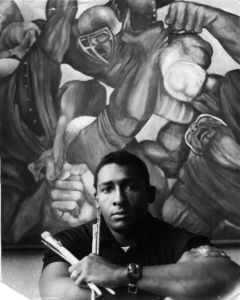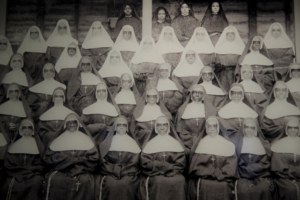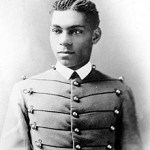People wondered if Durham’s Ernie Barnes would be an athlete or an artist. He was both.
Image: “Homecoming” by Ernie Barnes, 1994, will be included in “The North Carolina Roots of Artist Ernie Barnes” exhibition at the North Carolina Museum of History, which opens June 29 and runs through March 3. (The Ernie Barnes Family Trust)
(The News&Observer) Durham native Ernie Barnes might have been from a neighborhood called the Bottoms, but he propelled his way to the top using sports and art. He was nurtured by a mother determined to expose him to a larger world and by a supportive segregated black community.
Barnes, who would have celebrated his 80th birthday July 15, will be remembered through his paintings. “The North Carolina Roots of Artist Ernie Barnes” exhibition at the North Carolina Museum of History opens June 29 and runs through March 3.
The show features 37 oil and acrylic paintings, including a reproduction of his most famous painting, “The Sugar Shack,” which many people saw for the first time on soul singer Marvin Gaye’s “I Want You” album cover and during the closing credits of “Good Times,” the television sitcom that ran from 1974 to 1979.
Before his career as an artist, Barnes (North Carolina Central) was, a 6-foot-3, 250-pound offensive guard for the AFL San Diego Chargers and Denver Broncos. In 1993, he was named to the Sheridan Network’s All-Time Black College Football Team. (more)
The untold history of black nuns in the United States
(America) Ask most people what they know about black Catholic sisters, and they will probably murmur something about “Sister Act.” Dr. Shannen Dee Williams did, too, until she began digging into communities’ archives and uncovering the previously hidden lives of African-American women religious. Now she’s telling those stories in a forthcoming book (with an amazing title), “Subversive Habits.”
Shannen tells us about the incredible resilience and deep faith of black Catholic women in the face of racism, discrimination and exclusion. We ask her how these stories affected her own faith and what racial reconciliation in the church looks like today.
Listen to the podcast here.
In Search of Andy Cooper
The hunt for Waco’s forgotten baseball Hall of Famer
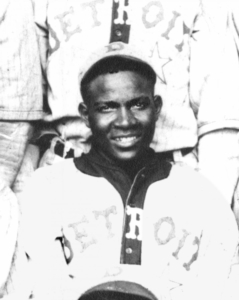 (Wacoan) On a rare stormy August morning, baseball historian and former Baylor religion professor John A. Wood and I walked the wet grounds of Greenwood Cemetery on the hunt for the grave marker of one the most famous Wacoans you’ve probably never heard of. Greenwood is Waco’s historic African-American cemetery, tucked away at the intersection of Business Highway 77 (New Dallas Highway) and Interstate 35. It was Wood, the author of “Beyond the Ballpark: The Honorable, Immoral and Eccentric Lives of Baseball Legends,” who first told me about the marker.
(Wacoan) On a rare stormy August morning, baseball historian and former Baylor religion professor John A. Wood and I walked the wet grounds of Greenwood Cemetery on the hunt for the grave marker of one the most famous Wacoans you’ve probably never heard of. Greenwood is Waco’s historic African-American cemetery, tucked away at the intersection of Business Highway 77 (New Dallas Highway) and Interstate 35. It was Wood, the author of “Beyond the Ballpark: The Honorable, Immoral and Eccentric Lives of Baseball Legends,” who first told me about the marker.
Walking amid the stones between Rice and Coffee streets is a haunting glimpse into Waco’s black past. Here is the tombstone for Jules Bledsoe, the Waco-born baritone who was the first black man to sing with the nation’s symphonies and who first sang “Ol’ Man River” on Broadway. Nearby is the marker for Vivienne Malone-Mayes, the extraordinary African-American educator who became the first black professor hired by Baylor University.
Just up the small path is a small stone, the size of a plaque, that states simply, “A.L. Cooper. Apr. 23, 1896, June 3, 1941.” It says nothing about Cooper’s astonishing career as one of the greatest pitchers and managers in baseball history, at a time when African-Americans could not compete in America’s national pastime. Nor does it mention that the Waco-born Andrew Lewis Cooper is enshrined in the National Baseball Hall of Fame in Cooperstown, New York. (more)
TIPHC Bookshelf
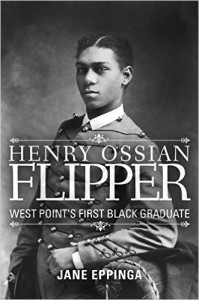 Published scholarship on black history in Texas is growing and we’d like to share with you some suggested readings, both current and past, from some of the preeminent history scholars in Texas and beyond. We invite you to take a look at our bookshelf page – including a featured selection – and check back as the list grows. A different selection will be featured each week. We welcome suggestions and reviews. This week, we offer, “Henry Ossian Flipper, West Point’s First Black Graduate,” by Jane Eppinga.
Published scholarship on black history in Texas is growing and we’d like to share with you some suggested readings, both current and past, from some of the preeminent history scholars in Texas and beyond. We invite you to take a look at our bookshelf page – including a featured selection – and check back as the list grows. A different selection will be featured each week. We welcome suggestions and reviews. This week, we offer, “Henry Ossian Flipper, West Point’s First Black Graduate,” by Jane Eppinga.
In 1878 Henry Ossian Flipper seemed destined for a long military career. Four years later, he was on trial at Fort Davis, Texas, for embezzlement of government funds and conduct unbecoming an officer and a gentleman.
Found “not guilty” of the more serious charges of embezzlement, the nation’s first black officer was court-martialed on the specious conduct charges. Thoroughly “humiliated, discouraged, and heartbroken,” Flipper would soon embark upon a career which in time would bring him more honor and fame than if he had remained in the military. One hundred years later, his name was cleared and the 1882 records of the black soldier were changed to reflect an honorable discharge.
The remarkable story of Henry Ossian Flipper, a young man born to slavery on the eve of the Civil War, and his struggle for recognition has left its mark on our nation’s history. Through extensive research of military documents, court records, appeals, and from Flipper’s personal journals and published papers, “Henry Ossian Flipper: West Point’s First Black Graduate” captures the sum and substance of a nation tom apart by political ambitions and extreme prejudices and reveals the uncertainty of acceptance and intolerance of blacks in America following Lincoln’s 1863 Emancipation Proclamation.
This Week in Texas Black History
Jun 27
Ronald “Ron” Kirk, the first black mayor of Dallas, was born on this day in 1954 in Austin. Kirk is the son of Willie Mae Kirk, a school teacher and civil rights activist, and Lee Andrew Kirk Sr., the first black postal clerk in Austin. Ron Kirk served two terms as Dallas mayor, 1995-2001. Prior to becoming mayor, he served as Texas Secretary of State (1994) under Gov. Ann Richards. Kirk graduated from Austin College in Sherman, and earned his law degree from the University of Texas. He served as U.S. Trade Representative from March 2009 until February 2013, and was the first African American to hold that Cabinet position as the president’s principal trade advisor, negotiator, and spokesperson on trade issues.
Jun 30
Lt. Henry O. Flipper, first black graduate of West Point, was court martialed and dismissed from the Army on this day in 1882 for “conduct unbecoming an officer and a gentleman.” Flipper was an officer in the Tenth Cavalry serving at Fort Davis (Texas) when he was accused of embezzlement as commissary officer. Flipper maintained his innocence until his death (May 3, 1940) and waged a lifelong battle for reinstatement in the Army. In December 1976, when a bust of him was unveiled at West Point, the Department of the Army granted Flipper an honorable discharge, dated June 30, 1882. An annual West Point award in honor of Flipper is presented to the graduate who best exemplifies “the highest qualities of leadership, self-discipline, and perseverance in the face of unusual difficulties while a cadet.”
Blog: Ron Goodwin, Ph.D., author, PVAMU history professor
Ron Goodwin is an assistant professor of history at Prairie View A&M University. Even though he was a military “brat,” he still considers San Antonio home. Like his father and brother, Ron joined the U.S. Air Force and while enlisted received his undergraduate degree from Texas Lutheran University in Seguin, Texas. After his honorable discharge, he completed graduate degrees from Texas Southern University. Goodwin’s book, Blacks in Houston, is a pictorial history of Houston’s black community. His most recent book, Remembering the Days of Sorrow, examines the institution of slavery in Texas from the perspective of the New Deal’s Slave Narratives.
Recent Posts
King of Kings
During his lifetime Martin Luther King consistently paralleled the experiences of the biblical Children of Israel and the experiences of Africans in America. As a result, he thrust himself into the role of Moses. What I find interesting in these parallels was the ultimate goal of the story. The Children of Israel, after 400 years of bondage, eventually made their way to the Promised Land. This was the message that I believe King was ultimately…
Wakanda Forever — Part 2
The internet records the following regarding the financial success of the Black Panther as of March 25, 2018: Receipts grossed $631.4 million in the US and Canada and a worldwide total of $1.239 billion; The film made $370.5 million worldwide in its opening weekend (the 15th largest of all time); Thus far, Black Panther is the highest-grossing solo superhero film and the 3rd third highest-grossing movie in the Marvel Cinematic Universe (MCU); and In only five weeks after…
Submissions wanted
Historians, scholars, students, lend us your…writings. Help us produce the most comprehensive documentation ever undertaken for the African American experience in Texas. We encourage you to contribute items about people, places, events, issues, politics/legislation, sports, entertainment, religion, etc., as general entries or essays. Our documentation is wide-ranging and diverse, and you may research and write about the subject of your interest or, to start, please consult our list of suggested biographical entries and see submission guidelines. However, all topics must be approved by TIPHC editors before beginning your research/writing.
We welcome your questions or comments. Please contact Mr. Michael Hurd, Director of TIPHC, at mdhurd@pvamu.edu.

